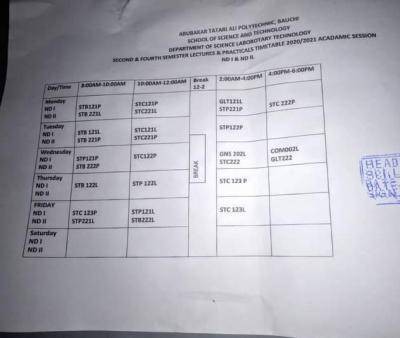
Business Studies lesson note for JSS1 Second Term is now available for free. The State and Federal Ministry of Education has recommended unified lesson notes for all secondary schools in Nigeria, in other words, all private secondary schools in Nigeria must operate with the same lesson notes based on the scheme of work for Business Studies.
Business Studies lesson note for JSS1 Second Term has been provided in detail here on schoolgist.ng
For prospective school owners, teachers, and assistant teachers, Business Studies lesson note is defined as a guideline that defines the contents and structure of Business Studies as a subject offered at SS level. The lesson note for Business Studies for SS stage maps out in clear terms, how the topics and subtopics for a particular subject, group works and practical, discussions and assessment strategies, tests, and homework ought to be structured in order to fit in perfectly, the approved academic activities for the session.
To further emphasize the importance of this document, the curriculum for Business Studies spells out the complete guide on all academic subjects in theory and practical. It is used to ensure that the learning purposes, aims, and objectives of the subject meant for that class are successfully achieved.
Business Studies Lesson note for JSS1 carries the same aims and objectives but might be portrayed differently based on how it is written or based on how you structure your lesson note. Check how to write lesson notes as this would help make yours unique.
The JSS1 Business Studies lesson note provided here is in line with the current scheme of work hence, would go a long way in not just helping the teachers in carefully breaking down the subject, topics, and subtopics but also, devising more practical ways of achieving the aim and objective of the subject.
The sudden increase in the search for JSS1 Business Studies lesson note for Second Term is expected because every term, tutors are in need of a robust lesson note that carries all topics in the curriculum as this would go a long way in preparing students for the West African Secondary Examination.
This post is quite a lengthy one as it provides in full detail, the Business Studies approved lesson note for all topics and sub-topics in Business Studies as a subject offered in JSS1.
Please note that Business Studies lesson note for JSS1 provided here for Second Term is approved by the Ministry of Education based on the scheme of work.
I made it free for tutors, parents, guardians, and students who want to read ahead of what is being taught in class.
JSS1 Business Studies Lesson Note (Second Term) 2024
JSS1 SECOND TERM BUSINESS STUDIES LESSON NOTE
| WEEKS | TOPICS |
| 1 | Revision/Production |
| 2 | Factors of Production |
| 3 | Entrepreneurship |
| 4 | Importance of Entrepreneurship |
| 5 | Form of Business organisation • Sole proprietorship • Partnership |
| 6 | Public corporation • Co-operative society |
| 7 | Limited Liability Company • Public Limited Liability Company • Private Limited Liability Company |
| 8 | Consumer and society • Consumer – market – society |
| 9. | Need for monitoring and control of chemicals |
| 10 | Introduction of Book – Keeping |
| 11 | REVISION |
| 12 | EXAMINATION |
WEEK ONE
TOPIC: PRODUCTION
Production is the transformation/changing or conversion of raw matterials into finished goods. It is the changing of natural resources or raw materials into finished goods, exchange and distributed in order to satisfy human wants.
In other words, it is the creation of goods and service. Production is not complete until the goods reach the final consumers.
Types of production
- Primary or extractive production
- Secondary or manufacturing production
- Tertiary production
Primary or extractive production
This is the first or early stage of production that involves bringing raw materials/natural resources from the soil, sea and forest e.g farming, hunting, lumbering, mining, etc
Secondary or manufacturing production
This is the secondary stage of production, raw materials extracted are changed/transformed into finished goods. It involves manufacturing and construction e.g. processed foods, textile industry, road/bridge construction, building cars, etc
Tertiary Production
At this stage, goods produced are distributed to the people for consumption. The people involves are wholesalers, retailers, exporters, transporters both professional and commercial services.
Effects of production on the Government and Society
The effects of production on any society will either be positive or negative.
Positive Effects
- It makes goods and services available for people.
- It helps to develop the society
- It improves the standard of living of the people.
- It helps in creating employment opportunities.
- It helps people to acquire special skills.
Negative Effects
- It brings about environmental pollution such as noise and smoke, etc
- It pollutes the land, e.g lack of proper disposal of waste products such as pure water sachet.
ASSIGNMENT
- What is production?
- What are the effects of production on the society.
WEEK TWO
TOPIC: FACTORS OF PRODUCTION
There are four factors of production namely:
- Land : rent
- Labour: wages or salary
- Capital: Interest
- Entrepreneur: Profit
- Land
Land is a free gift of nature. It is te oldest factor of production. It involves water, forest, wind resources, etc. Its reward is rent.
Features of land
- Land is a free gift of nature
- Land is immobile
- Land is subject to diminishing returns
- Its supply is fixed by nature.
Importance of land
- Land is used for cultivation i.e farming
- It is used for livestock production, rearing of animals such as goats, sheep, cattle and poultry, etc
- Land is used for wildlife conservation
- It is used for residential purpose e.g building houses, shops, etc
- Land is the source of minerals like gold, kerosene, petroleum, etc
- It can be used as collateral security to obtain loan in the bank.
- Labour
Labour means human efforts (both physical and mental efforts) put into production. Labour could be skilled, semi- skilled or unskilled. The reward for labour is wages or salary.
Features of labour
- Labour is a mobile factor. It can be moved from one place to another.
- It is a human factor
- It has feeling
- Labour cannot be predicted.
Importance of labour
- Labour is needed to operate machines.
- It influences other factors of production
- It helps in the production of goods and services.
- It provides the required skill needed in production.
- Capital
Capital is a man-made wealth used in production. The reward is interest.
Features of capital
- Capital is a man-made wealth.
- It is subjected to depreciation
- It can change its form
- Capital is highly durable.
Importance of capital
- Capital facilitates production
- It increases the standard of living
- It attracts investors on the business
- It can help in the production of quality goods.
- Entrepreneur
This coordinates and organizes all other factors of production for more productive purposes. He is the risk bearer manager and his reward is profit.
Features of Entrepreneur
- He is the risk bearer.
- He provides the capital for business
- He is a decision maker
- He employs labour
- He controls other factors.
Importance of Entrepreneur
- Entrepreneur provides the capital needed for production
- He bears the risk of the business
- He manages and controls the business
- He is the decision maker
Relationship between producer and the consumers
- Producer is someone/individual that manufactures the products or goods needed by the consumers.
- Consumers are those that make use of the goods .
Production starts with the producer and ends with the consumers. Production is not complete until the goods produced reach the final consumers.
Channel of Distribution
ASSIGNMENT
- Give the factors of production and their rewards.
- Explain land and its features
- State four importance of land
WEEK THREE
TOPIC: ENTREPRENEURSHIP
Entrepreneurship is the process of identifying developing and bringing a vision to life.
Meaning of Enterprise: is an establishment, a venture, a small scale business set up.
Meaning of Self Employment: is managing and controlling one’s business i.e. to be self – reliant. A small business is the seedbed of entrepreneurship.
Entrepreneurship is a self-employed person who puts together all the factors of production to start a new venture. In other words, entrepreneur is a person who organises and manages a commercial undertakings or business undertaking.
Pros / Advantages / benefits of Entrepreneurship
- You are your own boss
- You have control over your future
- There are more opportunities for you to make decisions
- Financial rewards – profit, income etc.
- Job security
- Self – satisfaction
- Recognition
- Cons / Disadvantages / drawback of Entrepreneurship Chance of business failure
- Time – consuming
- Income may not be secure or regular
- Stress
- Financial risk
- Sacrifices
Some world famous enterpreneurs are:
- Bill Gate
- Watt Disney
- Coco Channel
- Steve jobs
- Oprah Winfrey
Classes of Enterpreneurs
- Small scale business
- Medium scale business
- Private or self-owned establishment or business
- Large scale business
Assignment
- What is entrepreneurship?
- Give five qualities of successful entrepreneur in Nigeria
WEEK FOUR
TOPIC: IMPORTANCE OF ENTREPRENEURSHIP
Entrepreneurship is important. It benefits the locality by creating jobs for people and leads to a better standard of living.
Importance / Advantages of Entrepreneurship
- Entrepreneurship helps in identifying and developing managerial capabilities
- It helps in making a wide variety of goods and services available of living of the people.
An entrepreneur studies a problem, identifies its alternatives, compares the alternatives in terms of cost and benefit implications and finally chooses the best alternative.
Entrepreneurs contributes significantly towards national objectives in income generation and distribution, regional development of the economy and increasing the total output of goods and services.
New products, new techniques, new assembly lines and new markets are developed by entrepreneur.
Entrepreneurs who are self-dependent utilise resources which are locally available.
Entrepreneurship results in creation of organisations when entrepreneurs assemble and coordinate physical, human and financial resources and direct them towards the achievement of objective through managerial skills.
WEEK FIVE
TOPIC: SOLE TRADE
- SOLE PROPRIETORSHIP
Sole trade is the oldest of the forms of business organisation. It is a form of business which is owned, engaged and controlled by one person for the purpose of making profit.
Another name for sole trade is sole proprietorship or one – man business.
A man/woman who engages in sole trade is known as sole trader are shoe mender, law firms, kiosk owner, farmer, provision store etc.
Features of Sole Trade
- It is established to make profit
- It is easy to set up
- It gives room for quick decision making
Sources of Capital
- Personal savings i.e. contribution
- Loan from friends and relatives
- Loan from bank and government
Advantages of Sole Trade
- It is easy to run / establish
- It requires small capital to start
- There is freedom to run different types of business
- The owner enjoys the profit alone
- He/she controls the business alone
- He make fast and quick decision
Disadvantages of Sole Trade
- The owner bears the risk alone
- He/she works for long hours
- The death of the owner may end the business
- Wrong decision taking can lead to problem for the business
- The liability of the owner is unlimited
- PARTNERSHIP BUSINESS
Partnership business is a business organisation that exists between two to twenty persons coming together to form business for the purpose of making profit.
It requires minimum of two and maximum of twenty but in banking services, two and ten as maximum.
SOURCES OF CAPITAL
- Partners contribution
- By admission of new member / partner
- By ploughing back profit to the business
- Loan from commercial banks
FEATURES OF PARTNERSHIP BUSINESS
- It is not a legal entity business
- The liability of partners is unlimited
- It is owned by two to twenty people
- Profit and loss are shared based on partners agreement.
TYPES OF PARTNERS
- Active Partner: This is a partner that take part in the running and management of the business.
- General Partner: This is a managing partner and has unlimited liability.
- Sleeping / Dormant Partner: This partner only contribute part of the capital and does not take part in the running of the business.
PARTNERSHIP DEED
This is a written agreement between the partners. It contains:
- The name of the company/firm
- The name of partner
- The amount of central required
- The nature of business to be transacted
- How profit or loss will be shared.
Partnership Dissolution – means putting this life of an existing partnership business to an end i.e. dissolving the business.
ADVANTAGES
- It has no more capital than sole proprietorship
- The talent of individual partners can be developed
- Business account is not made published
- Better decisions are taken
- The partnership business can be developed into bigger organisation.
DISADVANTAGES
- There is delay in decision making because the partners are many
- Disagreement between partners may bring dissolution
- The liability of partners is unlimited
- The death of an active partner may put end to the business
WEEK SIX
TOPIC: PUBLIC CORPORATION
Public corporation is a business organisation set up, financed and managed by government not necessarily to make profit but to provide essential services for the members of the public.
FEATURES OF PUBLIC CORPORATION
- It is owned by government
- It is financed by the tax payers money
- It is set up to render essentials services to the public.
- It does not complete with any organisation
- It is established by the act of parliament
ADVANTAGES OF PUBLIC CORPORATION
- It has enough and sufficient capital
- It ensures fair and equal distribution of the services provided
- It serves as a means of controlling monopolies
- It raises the standard of living of the people
- It is owned by government
DISADVANTAGES OF PUBLIC CORPORATION
- It is very hard to set up
- It requires large amount of money
- There is delay in decision making
- Over production and wastages are common among them
- It lacks privacy
- Interference from government affects the efficient management of the corporation
Public corporation is also known as Enterprise or statutory corporation.
FULL MEANING OF SERVICES PERFORMED BY PUBLIC CORPORATION
- NIPOST – Nigeria Postal Services
- NPA – Nigeria Port Authority
- NRC – Nigeria Railway Corporation
- NWC – Nigeria Water Corporation (Water board)
- NITEL – Nigeria Telecommunication Limited
- NEPA – Nigeria Electric Power Authority (Now PHCN)
- PHCN – Power Holding Company of Nigeria PLC
CO – OPERATIVE SOCIETY
Co-operative society is a business organisation formed by people who have common interest in owning and running business for the benefit of their members.
TYPES OF CO-OPERATIVE SOCIETY
- Producer co-operative society
- Consumer co-operative society
- Multi-purpose co-operative society
- Credit co-operative society
PRODUCER CO-OPERATIVE SOCIETY: This is normally formed by group of farmers who produce agricultural products of the same kind e.g. cocoa, rice, beans etc.
The farmers who want to take advantage of cheap seeds and grains supplied by government marketing board.
CONSUMER CO-OPERATION SOCIETY: Is a society formed by a group of customers who contributes their money to buy goods in bulk for the benefits of their members.
MULTI-PURPOSE CO-OPERATION SOCIETY: This combines the activities of both the producers and consumers co-operative society types in carrying out its operation.
CREDIT AND THRIFT – Is a type of co-operative in which the members contribute money on regular basis to the purse of the society.
FEATURES OF CO-OPERATIVE SOCIETY
- It is the union of persons and not capital
- It provides services for the benefits of its members
- It is easy to form
- Every member is involved in running the business
SOURCES OF FINANCE
- Voluntary contribution from the members
- Fine and other special fees
- Plough back profit to the business
- Loan from government and banks
ADVANTAGES
- It encourages their members to form saving habit
- They gives loan to their members
- They purchase goods on behalf of the members
- It can be used to reduce exploitation
DISADVANTAGES
- Insufficient capital for the business
- Misunderstanding among members may affect the smooth running of the business
- Unfaithfulness of the management may put the business to an end
- Most of the management are not well experienced financially
- Most members are illiterate.
WEEK SEVEN
TOPIC: LIMITED LIABILITY COMPANY
This is a business organisation which has been in corporation. It is an association of individuals who agreed to jointly put their resources together for the purpose of having a business distinct from their owners.
It is a legal entity created through state approval and separate its owners. There are two types of limited liability companies:
- Public Limited Liability Company
- Private Limited Liability Company
PUBLIC LIMITED LIABILITY COMPANY
Public limited liability company that has a minimum of seven members and no maximum. It is owned by the members of the public e.g. UAC PLC, FIRST BAND PLC, NESTLE PLC, ACADEMY PRESS PLC etc.
They share profit called dividend yearly and the members are known as shareholders
FEATURES
- It shares can be traded and transferred the stock exchange market
- It is required to publish its account at the end of the trading period
- Workers can become shareholders
- Its name ends with Plc – Public liability Company
SOURCES OF FINANCE
- Contribution from members
- Loan and overdraft from bank
- Loan from private individual
- Create facilities from the supplier
ADVANTAGES
- It can sell share to the members of the public
- It can also borrow from the members of the public
- It engages in different line of business
- The share can be listed and quoted in the stock exchange market.
DISADVANTAGES
- It is expensive to set up
- It requires large capital
- Slow decision making
- The account must be published
PRIVATE LIMITED LIABILITY COMPANY
This is a company owned by Private Individuals. It can also be formed by a minimum number of the two and maximum of fifty members e.g. Oyelade Nigeria.
FEATURES
- It is owned by Private individuals
- It enjoys privacy
- The shares cannot be traded at the stock exchange market
- It must end with limited (LTD) e.g Marvic and associate Nig. Ltd
SOURCES OF FINANCE
- Contribution from members
- Loan from private individuals
- Credit facilities from suppliers
- Loan from bank and overdraft
ADVANTAGES
- It enjoys privacy
- Its management structure is simple
- The management and control are very easy
- The annual report might not be published except for the use of the company.
DISADVANTAGES
- Shares cannot be issued to the members of the public
- Borrowing from the public is not allowed
- Private limited liability company cannot be listed in stock exchange markets.
Assignment
- What is a company?
- Write short notes on:
- Consumer cooperative society
- Multi-purpose cooperative society
- Who is a sole proprietorship?
- Give five public cooperative
WEEK EIGHT
TOPIC: CONSUMER AMD SOCIETY
Who is a consumer?
A consumer is defined as an individual who buys good for his personal use. He/she buys goods and services and uses for his satisfaction.
Meaning of Market
A market is a place or situation where buyers and sellers come in contact to sell goods and services.
A market need not be a physical place or location, buying and selling can be arranged and carried out by telephone, letter fax, internet etc.
Meaning of society
Society is a group of people who have something in common e.g. religions, politics, values, etc. It is a group of people living together in a community.
CONSUMER EDUCATION
Consumer education means consumers acquire skills, concepts and understanding that are required satisfaction and utilisation of resources.
NEED FOR CONSUMER EDUCATION
There is need of consumer education to gain knowledge and skills to manage consumer resources and take actions to influence the factors which affect consumer decisions.
Consumer education like the general curriculum is a part of foundation on which students may begin to build their personal lives.
Consumer rights are very strong and can protect consumers. A consumer who is aware of consumer legislation and consumer protection aware to business malpractisces and aware of product and services standards and certifications can utilise the legislation
ADVANTAGES/IMPORTANCE OF CONSUMER EDUCATION
- Consumer education helps a person in making a proper purchase. It enables the consumer
- Consumer education familiarises the consumer with the problems which he faces while making
- Consumer education provides the consumer full information of marketing condition like various sources of purchasing a particular commodity
- Consumer education familiarises the consumer with various levels of standardisation and their marking
- Consumer education helps the consumer in getting maximum satisfaction by proper utilisation of his money and leads a better living standard
DISADVANTAGES
- Consequences of lack of consumer education
- Disturbing trend in business
- Consumers cannot be expected to throw their money without really knowing why or what to expect
- Consumers cannot pour money into the business of those who don’t understand it.
Assignment
- Who is a consumer?
- What is market?
- What is society?
- What are the advantages and disadvantages of consumer education
WEEK NINE
TOPIC: NEED FOR MONITORING AND CONTROL OF CHEMICALS
Meaning of chemicals – Chemicals are the distinct compound or substances which are prepared or purified artificially by means of different chemical reactions. E.g. baking soda, flavours of juice, medicine, food etc.
GRADES OF CHEMICALS
- Reagent A.C.S. – these are used in a laboratory
- R. – is used for chemical for research
- C.C – is used in the requirements of food
- C.P – is used in general applications
- Technical grade –used in general industrial use
- APE’s – are found in detergents, disinfectant, cleaners and laundry cleaners.
Need for monitoring and control of chemicals
The manufacture and use of chemicals is potentially harmful to human beings and livestock.
There are laws to control and protect human beings and the environment from chemical effluents and wastes. Waste according to the law refers to different categories which include industrial, solid, liquid, gaseous wastes containing substances which are jarful to human, animal and plant life.
Waste can also means any injurions, poisoners, toxic.
Any person found quality of purchasing, selling, importing, transporting, depositing or storing harmful waste can be convicted and sentences of life imprisonment in Nigeria.
Assignment
- What are chemicals?
- Name five areas in your life where chemicals are used
- Why are some chemicals harmful?
WEEK TEN
TOPIC: INTRODUCTION TO BOOK – KEEPING
Book – keeping is the systematic recording of daily transactions (cash and credit) in the appropriate book. It is the art of keeping proper accounting records of business transactions.
IMPORTANCE OF BOOK – KEEPING
- Book – keeping serves as a proof in time of doubt or confusion
- It helps to determine the profit of the business
- The record provides a means by which the finances of a business are controlled
- It helps to detect error
- It shows income and expenditure of the business
- Book – keeping provides a permanent records of all financial transactions
A book –keeper is a person charged with the responsibility of taking and keeping records of transactions in an organization.
Essential Qualities of Book – Keeping
- He/she must be able to write clearly
- He/she must be careful and accurate in calculation
- He/she must be computer literate
- He/she must be intelligent and not a forgetful person
COMMON BOOK – KEEPING PRACTICE
- The use of Naira and Kobo on the top of the account
- The use of two zero in the kobo column
- The double ruling which indicate the completeness and accuracy of the account
- The use of ‘F’ to represent folio
- The use of DR for debit and CR for credit
| Date | Particular | Folio | Amount |
| 5 March | Sales | G 100 | 50,000:00 |
BOOK – KEEPING ETHICS / PRACTICES
Book – keeping ethnics refers to the principles used in book – keeping. The principle is developed using double – entry system of Book – keeping.
The double entry system says “To every debit entry there must be a corresponding credit entry and vice versa”.
The ethnics are:
- Credit the giver account with the amount paid
- Debit the receiver account with the amount received
- Balance off the account at the end of the period.
Assignment
- What is book – keeping?
- State three essential qualities of book – keeping
- Workbook
Hope you got what you visited this page for? The above is the lesson note for Business Studies for JSS1 class. However, you can download the free PDF file for record purposes.
If you have any questions as regards Business Studies lesson note For JSS1 class, kindly send them to us via the comment section below and we shall respond accordingly as usual.




